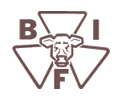Leachman Honored with Frank H. Baker Memorial Scholarship
SACRAMENTO, CALIF. (April 30, 2009) — Lance D. Leachman, Christiansburg, Va., received the 2009 Frank H. Baker Memorial Scholarship Award during the 41st Beef Improvement Federation (BIF) Research Symposium and Annual Meeting April 29-May 2, 2009, in Sacramento, Calif.
The award was presented by Robert Williams, director of breed improvement and foreign marketing, American-International Charolais Association, Kansas City, Mo.
The late Frank H. Baker played a key leadership role in helping establish the BIF in 1968. Each year since 1994, two deserving graduate students have been recognized for their winning essays during the BIF annual meeting.
Leachman was born in Maidstone, Sask., Canada. He holds a bachelor’s degree in animal sciences and industry with a business option from Kansas State University, Manhattan, and a master’s degree in animal and poultry science–breeding genetics from Virginia Polytechnic State University (Virginia Tech), Blackburg. Currently, Leachman is a graduate student at Virginia Tech.
An abstract from his award-winning essay follows.
Combined Selection for the Beef Cattle Industry
Beef cattle production entails a small sector of purebred seedstock producers supplying bulls to the much larger commercial sector. Crossbreeding plays a vital role in increasing the productivity and profitability of many commercial producers through breed complementarity and heterosis.
In commercial herds, bull selection should be geared toward producing crossbreds that are optimal for the production system, thereby raising the question, “Are we better served in utilizing purebred information alone, or a combination of purebred and crossbred information, in genetic evaluation of potential sires?"
Combined Crossbred Purebred Selection (CCPS) allows the combination of vast amounts of performance data potentially available on crossbreds with that on purebred cattle in a selection index or BLUP evaluation. The genetic correlation between purebred and crossbred performance indicates the extent to which genetic progress achieved in purebreds will translate to crossbred offspring. Genetic correlations of less than 0.7 suggest that crossbred data can aid in genetic improvement, due to the weak relationship between additive gene effects of purebreds and crossbreds. The purebred heritability and crossbred heritability are also useful for determining potential selection accuracy and potential rates of progress with CCPS.
Combined Crossbred Purebred Selection has been used in the swine and poultry industries; however, the increased requirements for pedigree and performance recording have limited its acceptance in beef cattle. Still, if genetic gains were sufficiently accelerated with CCPS, the potential use of molecular genetic tools to verify parentage in multiple-sire pastures may provide incentive to collect phenotypes on crossbred cattle. Adoption of CCPS needs to be evaluated as cost-effective and applied initially to intensively managed commercial operations.
Editor’s Note: This release is provided by the Beef Improvement Federation. The 41st BIF Research Symposium and Annual Meeting was hosted by the California Beef Cattle Improvement Association (CBCIA) and the California Cattlemen’s Association (CCA). For more information, contact Kelli Toledo at 559-972-8987 or visit www.calcattlemen.org/bif2009.html.



